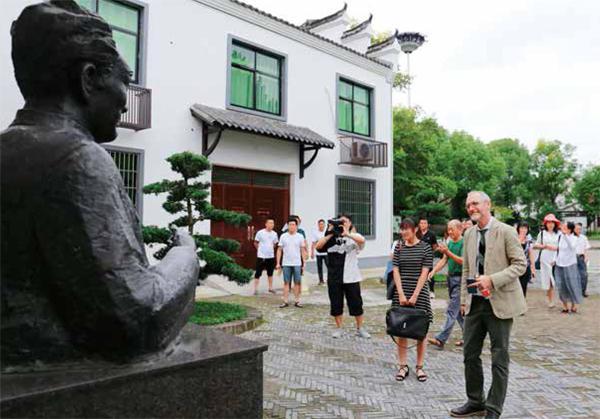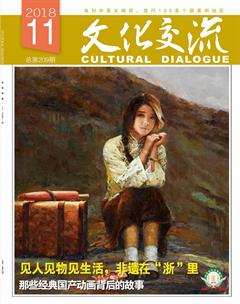中美诗人相约艾青故里,开启诗歌对话
叶星辰?徐贤飞
诗歌是一种世界语言,让人类灵魂相通。
9月17日,十位来自中国与美国的诗人齐聚金华金东区,走进艾青故乡,进行第二届中美诗学对话。这是诗歌领域的文化碰撞,中美两国诗人从自身生活背景、写作的心得体会等方面共同讨论两国诗歌现状与历史,促进两国诗歌的交流互动。
中美诗学对话由中国诗歌学会发起,由中国和美国学术机构定期组织。活动通过两国诗歌对话,用诗歌的语言,向美国诗人、学者及美国社会讲好中国故事。
中美诗学对话每年举办一次,第一届在美国俄克拉荷马大学举行。今年是第二届,邀请了包括汉芝·库克、贝内特·沃顿、劳拉·穆伦、金咏梅、石江山在内的美国主流诗人,以及王光明、王小妮、孙晓娅、黄亚洲、臧棣在内的中国著名诗人。
美国诗人看上“中国式”养老
为走近艾青、纪念艾青,主办方在诗学对话之前,特意组织10位中美诗人参观艾青家乡畈田蒋村,并把诗学对话的地点放在该村,让诗人们有更多的时间感受艾青的故乡以及艾青诗里的土地、人物、草木。
艾青故居是一座坐北朝南五开两厢的楼房,门口还立着艾青的半身雕像,满脸沧桑却目光炯炯,嘴巴微张着,似乎正对着广场、对着河塘、对着满山的松林吟诵诗歌:“打开你的窗子吧,打开你的板门吧,让我进去,让我进去,进到你们的小屋里……”
看着当年的土木家具上陈列着的艾青著作,以及艾青生前活动和写作的图片、资料,美国诗人库克激动地表示:“I love it(我爱这里)!”
当天,诗人们还走入畈田蒋村的居家养老中心。美国诗人石江山和金咏梅看着老人们在这悠闲地聊着天、吃着香喷喷热腾腾的午饭,连连感叹,“我希望这是我的家。”在他们的身后,低矮、局促的艾青保姆大堰河的故居依然保留着,“一家六口人挤在一张床上”的介绍,让两位美国诗人印象深刻。
“变化太大了!大堰河那首诗和她的家都是那样让人悲伤。而现在村里的老人跟朋友在一起吃饭、聊天,环境这么好,我们都羡慕了。”石江山说。
行走在艾青家乡的小巷里,美国诗人时常会被这里的老人拉住,或是问句“你好”,或是直接拉住他们的手,要求合影留念。
72岁的傅素云拉着美国诗人劳拉·穆伦拍照,她说:“艾青是我们的骄傲,有客人来了我们当然要热情接待。”傅素云在退休前是一位老师,以前在课堂上她也曾教过学生艾青的诗歌,每当这时,她总是会特别骄傲的对学生说,“艾青就是我们村中的人。”
当美国诗人来到保存下来的大堰河家,回顾着百年前的中国,再到如今的村居家养老中心,感受老人们的幸福生活,他们感慨万千。“这样的生活,是每个人的梦想。”石江山说,每个人都希望有个很好的老年生活。
诗人王光明说,艾青故居的独特之处,就是把诗人和诗作的主人公结合在一起,一同纪念,这让读者更好地了解艾青以及他创作诗歌的情境。
中美诗人探讨诗歌的现代性
“春眠不觉晓,处处蚊子咬”。美国诗人劳拉·穆伦一开始便说出了一句改编自中国古诗《春晓》的诗句,让在场诗人会心一笑。就这样,在一片融洽的氛围中,第二届中美诗学对话开始了。
在这场对话中,诗人们围绕新诗,从历史语境、诗歌创作、中美诗歌的互相影响等多个维度,畅所欲言,深入研讨。
中国诗人代表孙晓娅首先围绕诗人奥登对19世纪40年代的九叶派诗人杜运燮的影响进行阐述,并从歌唱无名英雄、开阔的生命意识、讽刺中的悲悯三个方面进行佐证,“正是对奥登的学习,使杜运燮成为奥登诗歌在国内最大的实践者。”
因为诗学对话中涉及到很多学术性的专业用词,在场的翻译们偶尔会停顿一下。不过来自美国的诗人石江山顺便说起了诗歌的翻译问题,化解了这小小的尴尬,“其实诗歌的翻译不仅仅是简单地将中文翻译成法文,或者将英文翻译成中文,这其中有很多文字的缠绕,有文字的韵味在其中,要把文字的含义都要表现出来。”
这个说法让著名文学评论家王光明非常赞同,他说:“诗歌的翻译是很特殊的,也叫作译写,诗歌的翻译也是一個再创作的过程。”
诗人王小妮说,自己写诗的时候不会特别去设计,跟守株待兔一样,等着它自己上门,而且会选择最先冲进脑海中的意象,因为它是第一念头,“以前写诗的时候,从来没有想过现代性的问题。不过现在回想起来,过去30年、20年、10年,我们把诗歌一首一首写出来。其实在这个过程中,有一个社会变迁的过程。一个生命的过程,都是自然而然发生的,诗歌的现代性也是一样。”
美国诗人贝内特·沃顿也提到了现代性这个说法,他说:“现代性是一个时代的标记,将来也会有比现在的现代性更现代性的东西。”
美国诗人劳拉·穆伦紧随其后,就杜运燮及当时的诗歌互译,讨论了中国诗歌的运用以及中国年轻人如何玩转古典诗歌。劳拉说,“春眠不觉晓、处处蚊子咬”,是中国网络上对于古诗的一次改编,从她的角度来看,这样改编古诗其实也是挺好玩的,“年轻人如何玩转古诗,也是我们现在需要探讨的一个问题。”
她还提到了现在诗歌中的一个意象的问题,“很多人在写诗的时候,关注的都是比较‘大的东西,但是我觉得我们写诗的时候,也可以从小处入手,比如昆虫,一些身边比较容易忽视的小东西……”
诗言志,歌咏言,美妙的诗歌,能够跨越时间,跨越国界。虽然双方的语言不通,但是因为诗歌,让两个国家的诗人可以坐下来,一起畅谈诗学。即使隔洋相望,也彼此深深地眷顾和影响着,这就是诗歌的生命与意义。
Chinese and America Poets meet in Home Village of Ai Qing in Jinhua
By Ye Xingchen, Xu Xianfei
On September 17, ten Chinese and American poets met in Jinhua and visited Fantianjiang Village where Ai Qing (1910-1996), a famous 20th-century Chinese poet, was born and brought up. The China-USA dialogue on poetry is an annual event jointly organized by academic institutions in China and USA to promote poetry and cultural exchanges. The first dialogue was held in 2017 at University of Oklahoma. This event is also an opportunity to expose China to American poets and for American poets to hear stories China tells in poetry and beyond.
The ten poets engaged at the second dialogue were Hedge Coke, Berrett Watten, Laura Mullen, Myong Mi Kim, Jonathan Stalling and their Chinese counterparts Wang Guangming, Wang Xiaoni, Sun Xiaoya, Huang Yazhou and Zang Di.
The poets visited the village and did sightseeing around before they sat down and started a dialogue on poetry.
The former residence of Ai Qing is a two-story house. In front of it stands a bust of Ai Qing. The house is like a museum displaying photos and objects which combine to relate the life story of the poet. During the sightseeing trip around the village, the poets visited the center for senior villagers and saw people having lunch at the dining hall. At the back of where these old people were sitting stands the former residence of Dayanhe, a nanny who took care of Ai Qing until the boy was 7 years old and went to school. Ai Qing wrote a long poem about the woman while he was in jail in 1933 for taking part in revolution. The poem made the poet and his nanny famous. Jonathan Stalling commented that the nannys house there reminded him of the long poem in which Ai Qing said the family of the six slept on the same bed because the poor family had only one bed. “What a change! The poem describes Dayanhe and her family in a bad sad situation. Now the seniors have dinner at the center and chat with friends. Such a beautiful village makes us envious!” said Stalling.
While strolling through lanes, the American poets were frequently approached by senior villagers to pose for a photo. Some senior villagers simply said Ni Hao.
Seventy-two-year-old Fu Suyun, a retired teacher in the village, posed for a picture with Laura Mullen. Before her retirement, she was a language teacher. She taught Ai Qings poems to her students and proudly announced that Ai Qing was from her village.
Wang Guangming commented that the former residence of Ai Qing was unique because it memorialized both the poets works and the poet, which made it possible for a reader to understand the poet and his inspiration.
At the dialogue, the poets addressed a series of issues about the new poetry, a new style adopted by Chinese poets in the early 20th century, when the vernacular Chinese became the mainstream of the written form. The poets explored the historical context, creativity, mutual influence of Chinese and American poetries.
Sun Yaoya, a Chinese poet, talked about W. H. Audens influence on Chinese poet Du Yunxie in the 1940s. She discussed the influence and concluded that Du became the biggest follower of Audens poetry in China.
As many academic terms and phrases popped up in the dialogue, interpreters were having a hard time. While interpreters were bogged down in some key words, Stalling talked about the translation of poetry. His comment on the challenges translators faced and the standard that should apply to translations led to another discussion. Wang Guangming agreed with Stalling, saying that translating a poem was rewriting the source poem in nature.
The poet Wang Xiaoni said that she didnt have any plan to follow while composing a poem. She would wait for a poem to appear by itself. “When I first wrote poems, I even never thought about modernity. Now looking back how poems came out one by one in the last 30 years, last 20 years, last ten years, they just kept coming. This process goes with the evolution of the society. A life happens in a natural way. So does the modernity of poetry,” reasoned Wang.
Berrett Watten observed that modernity was just a mark of an era and that the modernity of the future would be more modern than the modernity of today.
Laura Mullen discussed how a poet would handle topics. “Many poets concern themselves with big things, but I feel we may as well start with something small. An insect, for example. Small things around us often go unnoticed,” said the poet.

